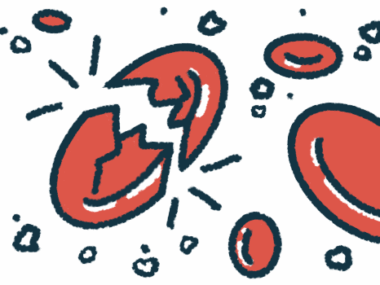A sad, cold, and gray day put my health in jeopardy
A real-life example of how cold exacerbates cold agglutinin disease symptoms
Written by |

The rain looked like shards of ice in front of my face. I was bundled up as much as possible on that cold November day. The sky was as gray as I felt as we buried my beloved sister-in-law.
Because I had just recovered from a recent illness, I stood at the back, slightly out from under the canopy reserved for family. I was fine with that. I did not want to see my friend lowered into the ground.
Word had come to me just 10 days earlier. I was warm in my tropical paradise on the other side of the world. I had read about the cold front entering Alabama, but had given it little thought, as I was well insulated from that dangerous climate.
My brother called me on Sunday to let me know she was hospitalized. The prognosis was grim. I told him I would leave on the next plane for my home.
My sister-in-law and I had shared many experiences. Packing for that 50-hour plane trip was difficult. My emotions were in disarray, and I didn’t have warm clothing in Papua, Indonesia, where I lived. Airports and airplanes, with their varying climate conditions, were also problematic. Some airports, like in Jakarta, were hot, but planes are often cold. I would be landing in Atlanta, and I needed clothing from the airport to my home in Auburn, Alabama. I would be walking a lot, which would also wear down my system.
Plane travel can wear you out!
Another surprise
Since I was diagnosed with cold agglutinin disease, I have become familiar with the symptoms, which herald the escalation of my blood condition. Stress, whether because of grief or overusing my body, makes me more susceptible to hemolysis. Not only that, but somewhere on that dreaded plane ride, I contracted COVID-19.
I had heard all of the horror stories about that disease. I wondered if it would contribute to making my health perilous. I have learned that our lungs have approximately 1,500 miles of airways, and if the surface area were somehow laid flat, it would be roughly the size of a tennis court.
Breathing cool air — for me, cool starts at about 65 F — causes difficulty as that coldness hits the capillaries on the surface of my lungs. There is a sharpness to every breath I take. Very quickly, I begin to feel pain in my chest. It helps to cover my mouth and nose, but sometimes I don’t do that quickly enough. This was a problem for me as I interacted with family and friends once I could be among people again.
The worst of it came about a week after the funeral. I remained with family for the rest of November. During this time, the weather warmed slightly, although more cold weather with freezing temperatures was predicted for early December. By now, I had developed a slight cough. I couldn’t sing hymns in church. My voice would just shut off. I was tired. If I didn’t have to return to a warm, tropical climate, I would’ve contacted my doctor and asked for my blood to be checked.
I had a choice: Should I stay or should I go?
Choosing recovery
I chose to go. I was barely strong enough to walk the miles of airport corridors. I planned for that with the knowledge that I could ask for a wheelchair if I needed one. My longest flight was around 13 hours. That is plenty of time to rest and recover, but it was difficult.
I had a challenge at check-in. I had two very long layovers. The last flight was around five hours long, a relatively short flight. But it was a red-eye, leaving Jakarta around midnight.
My husband met me at the airport. I had a cough. I had no energy or will to do anything other than sit. Right now, I don’t remember very much about December. A low-key celebration of Christmas was planned, and that was all I could do. I also had general aches and pains that sometimes kept me awake. Another symptom I had was mild urinary tract infections (UTIs). I did not let those develop!
It is now six months later, and I’m still not quite over the minor setback I experienced. I’m better than I was in December. But I must be ever vigilant against UTIs. Despite all of this, I’m glad I returned to Papua and avoided the winter in the States.
I’m also glad I went to the funeral. She was that important.
Note: Cold Agglutinin Disease News is strictly a news and information website about the disease. It does not provide medical advice, diagnosis, or treatment. This content is not intended to be a substitute for professional medical advice, diagnosis, or treatment. Always seek the advice of your physician or other qualified health provider with any questions you may have regarding a medical condition. Never disregard professional medical advice or delay in seeking it because of something you have read on this website. The opinions expressed in this column are not those of Cold Agglutinin Disease News or its parent company, Bionews, and are intended to spark discussion about issues pertaining to cold agglutinin disease.








Leave a comment
Fill in the required fields to post. Your email address will not be published.